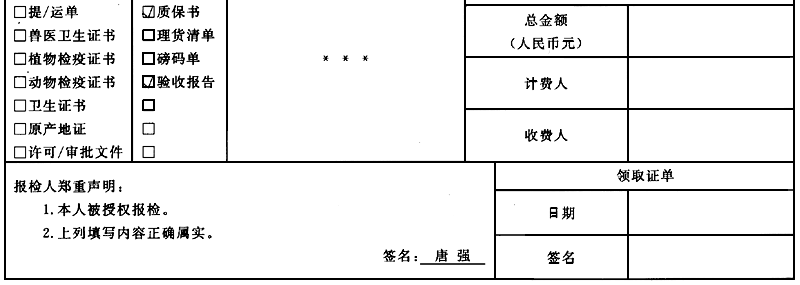请根据所提供的单据,完成相关的判断题第131~150题。
东莞三星视界有限公司与韩国一家公司签订一份购货合同,合同规定中方从韩方购买一批电池芯,用于生产加工电子钟,货物于2006年6月15日到达深圳口岸。东莞该公司报检员持合同、发票、提单向深圳检验检疫机构报检。
东莞三星视界有限公司
DONG GUAN SAMSUNG SDI,CO.,LTD
广东省东莞市厚街镇河田区湖景大道高科技工业园
High Technology Industrial Zone.Houjie,Dongguan,GuangdOng,China
TEL:0769—5582000 FAX:0769—5821600
购货合同
PURCHASE CONTRACT
买方(THEBUYER):东莞三星视界有限公司 合同号(CONTRACTNO):DSDI/200605/028
日 期(DATE):2006年5月8日
卖方(THE SELLER):SAMSUNG SDI C0.,LTD(CHONAN) 地 点(PLACE):东莞
兹经买卖双方同意按照以下条款由买方购进卖方售出以下商品:
THIS CONTRACT IS MADE BY AND BETWEEN THE BUYERS AND THE SELLERS,WHEREBY THE BUYERS AGREE TO BUY AND THE SELLERS AGREE TO SELL THE UNDER-MENTIONED GOODS SUBJECT TO THE TERMS AND CONDITIONS AS HEREINAFTER:

(7)到货日期(DATE OF ARRIVAL):2006年6月15日
(8)运输标志(SHIPPING MARK):
(9)包装(PACKING):10个纸箱
(10)装运港(PORT OF LOADING):香港
(11)目的港(PORT OF DESTINATION):东莞
(12)保险(INSURANCE):由买方负责
(13)付款方式(PAYMENT):T/T
(14)产地(COUNTRY OF ORIGIN):韩国
(15)检验和索赔(INSPECTION AND CLAIMS):货卸目的港后买方有权申请中国出入境检验检疫局
(CIQ)进行检验,检验结果与合同约定的不符的,买方有权根据CIQ出具的证书提出索赔,索赔有效期限为货卸目的港后90天内。
(16)仲裁(ARBITRATION):一切因执行本合同或与本合同有关的争执最终由中国国际经济贸易仲裁委员会按其规则进行仲裁。仲裁费用由败诉方负担。
(17)其他(REMARKS):本合同受国际商会“INCOTERM2000”的约束。
买方(THE BUYER): 卖方(THE SELLER):
中华人民共和国出入境检验检疫
入境货物报检单
报检单位(加盖公章):东莞三星视界有限公司 *编 号______________
报检单位登记号:7100511023 联系人:唐强 电话:72352010 报检日期:2006年6月10日



注:有“*”号栏由出入境检验检疫机关填写 ◆国家出入境检验检疫局制